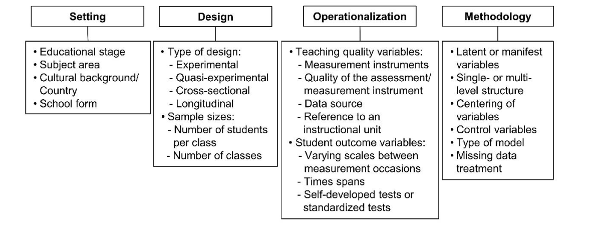EffecT – Explaining Inconsistent Effects of Teaching Quality on Educational Outcomes
The aim of the project is to identify aspects contributing to divergent results in teaching quality research. These aspects will be systematized to subsequently determine their relative contribution to the heterogeneity of effects.
Project Description
The focus of classroom research is to identify factors of teaching that foster student learning outcomes. The ultimate goal is to inform policy makers and practitioners in the field about teaching practices and educational initiatives that improve student learning. Various meta-analyses within the research field exist. They show large deviations in effect sizes across studies that investigated the same substantial research question, which implies replication failure.
Numerous meta-analyses point to inconsistent and even contradictory results, making it challenging to derive straightforward recommendations and raise doubts about the credibility of research results. Reasons for deviations could be that the studies vary with respect to several aspects (see Figure).

In contrast to meta-analyses and reviews, which rely on results from previously analyzed data, the EffecT-project uses existing data from various education studies to conduct systematic reanalyses to identify particularly significant aspects for the emergence of inconsistent results.
Project Objectives
The two main objectives of the EffecT-project are (1) to identify and precisely define possible aspects that might explain variance in effects of teaching quality, and (2) to determine the relative importance of those aspects for the heterogeneity of results.
In pursuit of the first research objective, we will categorize data sets with respect to differences in (a) the setting, (b) the design and (c) the operationalization of constructs. We will further define methodological factors that might influence the estimated effect. To achieve the second research objective, we will harmonize the data sets, run the secondary analyses using different methodological approaches, and estimate which aspects explain which proportion of variance in the effects. In the end, these findings aid in the planning of future generalizability analyses and conceptual replications that result in meaningful recommendations for practitioners.
Funding
Cooperations
One cooperation partner is Professor Dr. Anna-Katharina Praetorius from the University of Zurich.
Project Management
Project Team
Talha SajjadProject Details
| Status: |
Current project
|
|---|---|
| Area of Focus | Open Science |
| Department: | Teacher and Teaching Quality |
| Units: | |
| Education Sector: | Primary and Secondary Education |
| Duration: |
10/2023 - 09/2026
|
| Funding: |
External funding
|
| Contact: | PD Dr. Carmen Köhler, Academic Staff |